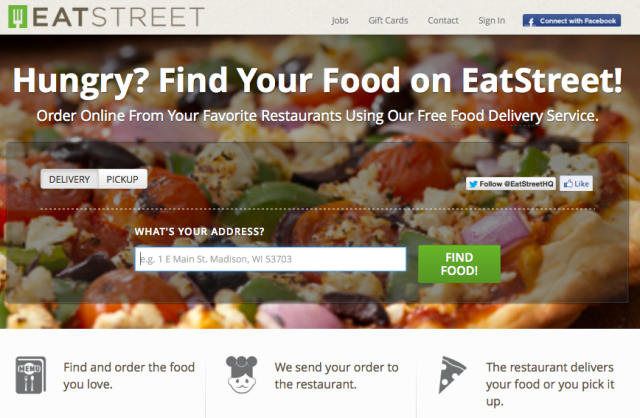The online ordering market for restaurants has a new competitor today. A startup called EatStreet has made it to Series A by targeting the secondary markets across the U.S. for its expansion. The $2 million round was led by Cornerstone Opportunity Partners, and includes participation from Great Oaks VC, Independence Equity, and the Wisconsin-based accelerator gener8tor.
The company was started by University of Wisconsin graduates in 2009, who were then sophomores at the time. Initially, explains CEO Matt Howard, it was more of a project, but the service almost immediately scaled up to 100 restaurants in the startup’s hometown of Madison. Six months in, they started to see real traction. Today, EatStreet has grown to 20 cities and over 1,000 restaurants, primarily on the East Coast and in the Midwest.
Although it’s taking on major players, including Seamless, GrubHub, OLO, and others, EatStreet is different because its focus is on doing more than online ordering – it’s aiming to be a one-stop shop for restaurants. “EatStreet’s main goal is to give restaurants websites, their own mobile apps, their own mobile websites, their own Facebook ordering – we’re giving them everything they need for online ordering…we push more of a platform approach,” Howard explains.
The restaurants receive everything they need up front at no cost, then EatStreet takes a commission on every sale through its platform, which is somewhere between 8 and 10 percent. In addition, the restaurants are listed on the main ordering website, EatStreet.com.
Today, the startup, also co-founded by Alex Wyler and Eric Martell, has 14 full-time employees, and is nearly profitable as it’s looking to expand nationwide. Though its competitors have a head start in some of the key regions across the U.S., Howard believes the market is big enough for a player which focuses on the smaller cities and towns.
“I’m not going into Chicago, New York or L.A. – those markets are very much a first-mover advantage,” he says. “The markets we’re targeting are those 200,000 to 500,000 people markets where restaurants have no idea what they’re doing, and they don’t want to do it themselves. They want someone else to do it for them because they don’t have the time, money or resources to make it happen.”
He notes that in some of these regions, it’s not even just about delivering online ordering to these businesses, it’s about getting them online period. “There are markets we go into where 50 percent of our restaurants don’t even have a website,” Howard remarks.
Most of the funding will be used to aid in expansion efforts, as EatStreet plans to enter 25 to 30 more cities nationwide this year, five of which are underway now. The company, still in Madison, also plans to add around 2 more employees per market as it grows. “The main reason Cornerstone was interested was how cookie cutter we made our model,” Howard adds of the lead investor’s interest in funding EatStreet’s growth. “Being able to go into a market, get the restaurant signed up, get the employees hired, and get them going in the market – we’ve made it a science,” he says.

